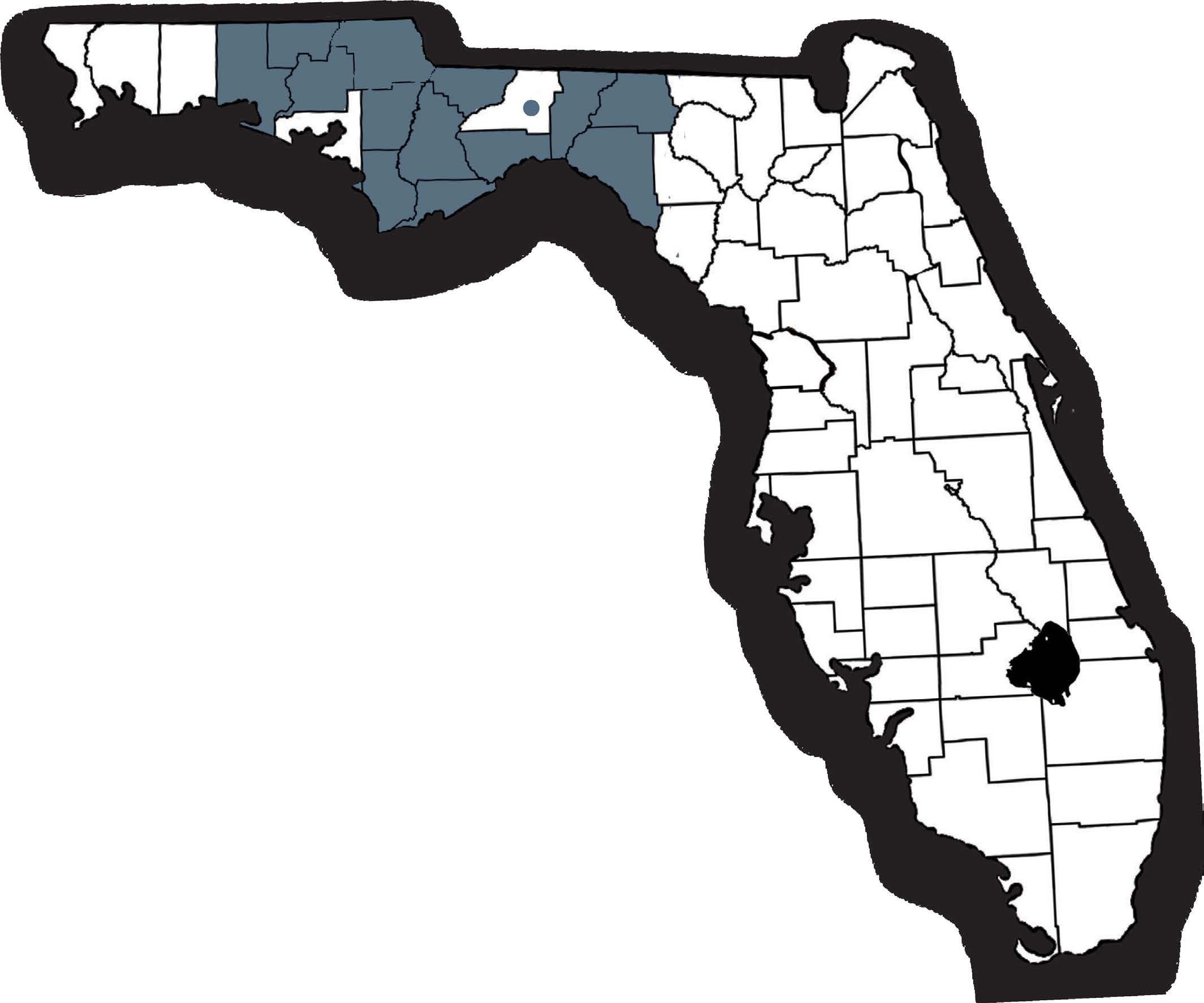Advancing Reading Through Science



Through rigorous and robust research, innovation, and engagement, The Florida Center for Reading Research (FCRR) advances the science of reading to improve learning and achievement from birth through adulthood. FCRR contributes to the quality, accessibility, use and relevance of reading and reading-related research by leveraging talent, resources, and partnerships. We invite you to explore this flipbook, highlighting a variety of our current projects and their impact on reading education locally and globally.
For over 20 years FCRR has been advancing reading research, impacting children across Florida and beyond. “Through its research and outreach, FCRR has been able to advance the science of reading and to help educators access the best and most up-todate knowledge on the development of reading and reading-related skills as well as effective reading and early literacy pedagogy,” stated FCRR Associate Directors Drs. Christopher Lonigan and Beth Phillips. “Importantly, our partnerships with educators and policymakers have helped us understand the questions and issues that teachers and administrators see as most central to working with children effectively, and these insights have helped shape our research and dissemination work in meaningful ways.” The projects featured in this flipbook demonstrate FCRR’s commitment to rigorous and robust research, innovation, and engagement and the dedication of our faculty, students, and staff.
As you leaf through this flipbook, you will see examples of the interdisciplinary and translational research, facilitating collaborations at the local, national, and international level, which produced original rigorous and relevant research that addresses pressing educational needs. We hope you enjoy learning how our efforts are shaping the future of reading education.
Thank you for joining us and supporting our mission.

Florida Department of Education

To build a capacity of literacy coaches across the state to support teachers in implementing evidence-based literacy practices
To develop a program to increase the number of literacy coaches across the state 12

68 districts represented


“This took my coaching to a new level. I say it is truly the best professional development I have
EVER
been involved in for 25 years.”

To build educators’ capacity to implement evidence-based instructional strategies to impact student achievement
To develop a pathway to use in districts to increase the number of reading endorsed educators 12


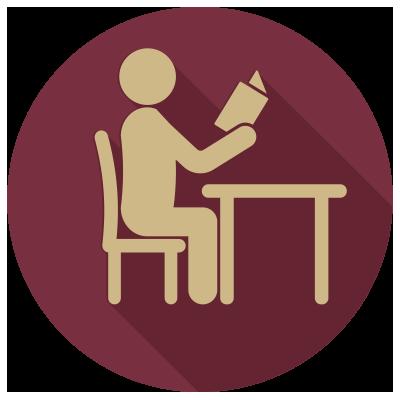



Competency 1 Foundations of Reading Instruction
Competency 2 Application of Evidence-based Instructional Practices
Competency 3 Foundations of Assessment
Competency 4 Foundations & Applications of Differentiated Instruction

Competency 5 Demonstration of Accomplishment 61 districts represented

To build school and district leaders’ capacity to implement evidencebased and evidenceinformed literacy practices in their schools
To help create an environment of collaboration among leaders, coaches, teachers, and others that effectively support literacy learning for all students 12
“The collegial conversations were helpful for sharing strategies and solutions. The series gave us a step-by-step process for improving our literacy team and for problem solving.”
districts represented


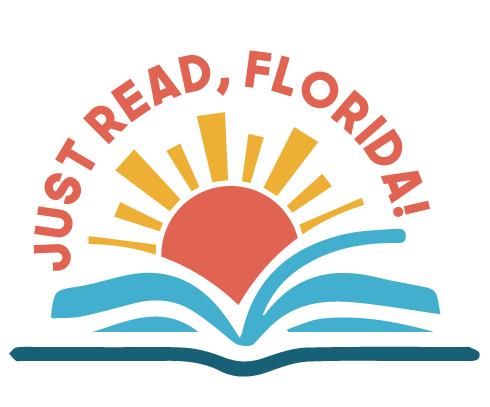


fcrr.org/projects/ language-leaps




Dr. Beth Phillips
Felesa Oliver
Karli Willis
languageleaps@fcrr.org
Leap into the world of emergent literacy with Language Leaps! Language Leaps is a new supplemental curriculum for 2- and 3-yearold children adapted from the evidence-based Literacy Express prekindergarten curriculum.
After two years of development and piloting, Language Leaps will begin a randomized control trial in the Fall of 2024 with 15-20 classrooms throughout north
Florida. Half of the classrooms will implement Language Leaps for 25 weeks throughout the 2024-2025 school year. Selected teachers will receive a curriculum kit that includes 8 occupation puppets, 55 children’s books, a playroom community map rug and large pictures as well as a coach and professional development to support implementation. At the end of the 25 weeks, the control classrooms will also receive a curriculum kit and professional development.

Language Leaps follows the model of Literacy Express and is structured around six thematic units addressing oral language, emergent literacy, early math, science, general knowledge and socioemotional development. It can be used in half- or full-day programs with typically developing children and children with special needs. The program provides professional development opportunities for staff, teaching materials, suggested activities, and recommendations for room arrangement, daily schedules and classroom management.

Building off the original Project VOICES, which was conducted from 2015-2018, VOICES II seeks to learn more about teachers’ language and teacher-child interactions within the preschool classroom environment. Using archival data, researchers will focus on three quality facets of linguistic features of teacher talk across five distinct interaction settings, and how they each predict children’s language skill growth.
One of the key strengths of VOICES II is its large and diverse dataset, which is comprised of 86 preschool teachers representing the three main site types of private, public, and Head Start settings and 583 children between the ages of three to five years old.
Coding began in July of 2022 and project staff continue to actively code and transcribe teacher and child audio, as well as classroom video.
ies.ed.gov/funding/ grantsearch/details. asp?ID=5786
Dr. Beth M. Phillips Principal Investigator bphillips@fcrr.org
Dr. Sonia Cabell Co-Principal Investigator scabell@fcrr.org

Dr. Shayne Piasta, Program Director
The Ohio State University
School Districts –Calhoun, Grady, Leon, Liberty, Marion
Phonological Awareness is an “umbrella term” referring to the ability to hear and manipulate sound units in speech. It is represented in educational curricula and learning standards across the country. Decades of research on the science of reading have established that phonemic awareness – the part of phonological awareness specifically about hearing and manipulating individual speech sounds – is a critical component for literacy learning. Developmental research also indicates that young children exhibit awareness of larger sounds units, like syllables and onsets/rimes, ahead of phonemic awareness. This suggests that teaching larger units before phonemes may be helpful. However, there is insufficient research testing this idea.
This project is seeking answers to the questions: What to teach? To whom? When? Researchers will identify preschool and kindergarten children who may benefit from additional phonological awareness instruction, provide select children with phonological awareness instruction using different approaches (15 minutes per day for 6-12 weeks), and assess their phonemic awareness and literacy skills through first grade. The goal is to provide extra literacy support to participating children and gain scientific evidence to inform educational practice and policy.

Adapted from Phillips et al. (2008), Piasta & Hudon (2022)
Dr. Beth M. Phillips
Principal Investigator
bmphillips@fsu.edu

fcrr.org/projects/project-flex
To better understand the skills associated with early word reading, Project FLEX explores how set for variability, the ability to successfully problem solve inconsistent letter/ sound relationships, and word reading develop together. Additionally, we are exploring how well set for variability can be used as an identifier of risk for early word reading difficulties by examining how set for variability performance at the fall of kindergarten contributes to the prediction of word reading at the end of grade 1. The findings from this study will help highlight the skills involved in learning to read and inform our understanding of reading development.

Set for Variability refers to a child’s ability to address the mismatch between the decoded form of a word (the oral language result of applying phonics to words) and their stored word pronunciation. We know through the work of Steacy et al. (2019) that a child’s set for variability is important to both their general reading, and their item-specific word reading skills.
Dr. Laura Steacy Principal
Investigator lsteacy@fcrr.org
Dr. Ashley Edwards
Co-Principal Investigator aedwards@fcrr.org



fcrr.org/projects/ project-wordy


Dr. Laura Steacy Principal Investigator lsteacy@fcrr.org
Chelsea Starke Project Manager cstarke@fcrr.org

x.com/projectwordy
English contains many “complex words,” a large class of words in which the relationships between orthography, phonology, morphology, and semantics are relatively opaque. Students have difficulty with complex words because they cannot directly arrive at the correct pronunciation of a word by applying typical sounding out strategies. Complex words are important because they comprise a large portion of the content-specific information needed to comprehend expository text. Without the skills required to read complex words, students often skip or guess these words which can negatively impact their academic knowledge. Research and theory suggest that instruction that builds students’ morphological knowledge and set-forvariability may be associated with better complex wordreading outcomes.

These “complex words” are at the heart of Project Wordy. The project aims to explore the effect of different approaches for teaching complex words on reading outcomes of students with and without dyslexia. Using a multifaceted research design, we are exploring the mechanisms underpinning complex word-reading acquisition. This work is designed to help teachers better serve children with dyslexia and other learning differences by providing them with advanced word-reading and decoding strategies. These strategies will allow students to move from reading simple, one-syllable words to more complex multisyllabic and multimorphemic words.



English spelling is described as quasi-regular, meaning a system in which the relationship between input (i.e., orthography) and output (i.e., phonology) is systematic, but with many inconsistencies (often referred to as exceptions). Quasi-regular orthographies, such as English, place added demands on word reading development in children. As a result, English is particularly difficult for developing readers, which requires them to develop a diverse set of decoding strategies. Even with a diverse set of decoding strategies, some words are more difficult for children to learn to read than others (e.g., suede and yacht). However, currently we do not understand all the factors that contribute to differences in word reading difficulty in children.
The developmental English Lexicon Project (d-ELP), a Learning Disabilities Innovation Hub funded by the National Institute of Child Health and Human Development, seeks to understand factors associated with word reading development in children (grades 1-5) that result in some words being more difficult to read than others. In addition, the d-ELP will explore important differences in word reading development across typically developing students and students with and at-risk for reading disabilities with a particular focus on important historically under-represented populations (including speakers of African American English (AAE) and English Learners (EL) exposed to Spanish in their homes).
To accomplish this, we will obtain estimates of word reading difficulty for the 10,000 most frequent English words with a diverse sample of 2,000 children in grades 1-5 including oversampling of children with and at-risk for reading difficulties. This project will expand the scientific infrastructure for research on reading development and provide a much-needed, large-scale, dataset of developing readers’ behavior, especially on children from diverse backgrounds and varying reading skill. It will also purposely sample, for the first time, readers from diverse demographic backgrounds (Black, Spanish-speaking EL, low SES) and reading skills (with over-sampling of individuals with and at-risk for reading disabilities), to allow for analyses of both group- and individual differences in word reading development. The d-ELP data will be a valuable resource for teachers, school leaders, researchers, and educational publishers and policy makers.


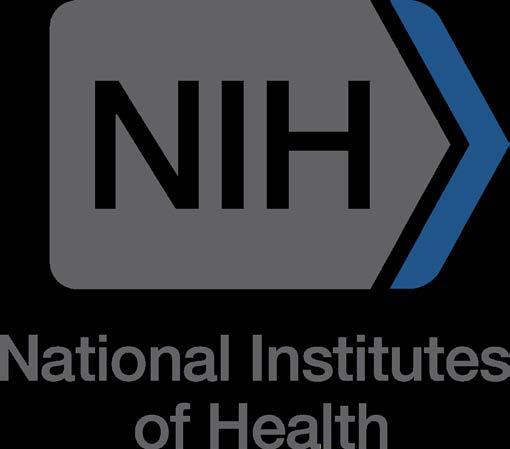
Dr. Donald Compton Principal Investigator dcompton@fcrr.org
Dr. Laura Steacy Principal Investigator lsteacy@fcrr.org
Chelsea Starke Project Manager cstarke@fcrr.org
The Collective is a diverse group of researchers who are working with educators, families, policymakers, and other partners to better understand learning disabilities in reading and language among young children to better understand specific learning disabilities in reading and oral language among young children. The Collective is one of only two Learning Disabilities Research Centers in the nation funded by the National Institutes of Health.
The Learning Disabilities Research Centers (LDRC) are designed to broaden the scientific and practical understanding of learning disabilities and co-occurring conditions. The Learning Disabilities Translational Science Collective (The Collective) is one of two federally funded centers. It is foucsed on specific learning disabilities in reading and oral language among young children.
The Admin Core helps us reach that goal by:
It is a process for turning results from research studies into innovations that can help people. It can help us bridge the “research to practice gap”.
The Collective is an international team organized into 4 Research Projects supported by Administrative, Data, and Engagement Cores. The team is racially, linguistically, and culturally diverse, led by women, and includes senior scientists, early career scholars, and graduate and undergraduate students.
1. Florida State University
2. MGH Institute of Health Professions
3. University of Virginia
1. overseeing the planning, management, and implementation of the Collective
4. University of Waterloo
5. Northwestern University
2. facilitating synergy and collaboration across the research projects and cores
Since 2006, researchers at the Florida Learning Disabilities Research Center have been studying how best to identify and treat learning disabilities in reading and language. They made many important discoveries that matter for children with disabilities. Together, members of The Collective will push the work even further by:
6. Vanderbilt University
3. supporting the effective conduct of research and its translation into practice
4. maximizing the diverse expertise and voices of researchers, early career scholars, partners, and stakeholders across the Collective.
1. making new discoveries
7. Yale University
8. Brock University
9. University of Kansas
10. University of Washington
11. Washington University in St. Louis
2. translating them into practical solutions
The Administrative Core has five specific aims or responsibilities.
3. engaging in underserved and marginalized communities to make sure the discoveries and solutions are useful and impactful for all children.
The whole is greater than the sum of its parts.
1. Facilitate research & translation
The Collective works as a team. We leverage everyone’s unique expertise and talents. We look for ways to deepen our collaboration. We elevate diverse voices and we respect diverse perspectives. Most importantly, we keep our focus on the children. These principles help us make sure our work together serves them well.
● Shared Leadership
● Broadening Participation
● Synergy
● Respect
● Translation
● Project 1 will study the identification and classification reading disabilities and develop tools to better predict children’s risk for reading disabilities
2. Enhance collaboration
3. Engage advisory boards
● Project 2 will study how genes and the environment influence how well children respond to reading interventions and develop resources to help educators and families better understand genetic influences on reading.
4. Monitor & evaluate progress
● Project 3 will study barriers and facilitators to identifying reading and language disabilities in urban and rural schools and develop resources to help educators use evidence-based practices in school.
5. Promote diversity & inclusion
The Admin Core is also responsible for guiding the project staff through reporting, budgeting, and ongoing project activities (such as publication and translation). The cores (Admin, Data and Engagement) form the practical scaffolding for the projects and provide cohesion across them.
● Project 4 will study early reading and language screening data and develop tools to help educators implement effective classification systems in schools and districts.
P50HD052120



National Center on Improving Literacy
Operated by Boston University’s Wheelock College, NCIL is a partnership among literacy experts, university researchers, and technical assistance providers from Florida State University and RMC Research Corporation. It is funded by the United States Department of Education.
NCIL aims to increase access to and use of evidence-based approaches to screen, identify, and teach students with literacyrelated disabilities, including dyslexia. We focus on building individual and organizational capacity to assess students’ literacy-related skills, identify students with disabilities or those at risk, and provide effective literacy instruction.
FSU operates as Strand 1 of NCIL, which is dedicated to identifying and developing free or low-cost, evidence-based assessment tools for identifying students at risk of not attaining full literacy skills due to disability. Our products include:
• Adolescent Assessment of Literacy (AAL), a free online literacy assessment for grades 3-12 (aaliteracy.com)
• Kayla and Andre Chronicles, a comic series following siblings with special powers as they learn to overcome their literacy disabilities
• Clash of the Heroes, an annual character creation contest in partnership with various state agencies and institutions
• Infographics that summarize the latest in literacy research and assessment development



Parents & Families: Help your child read and write with practical ideas and strategies based on what works.
Schools & Districts: Find evidence-based approaches and effective professional development on screening, identifying, and teaching students with literacy-related difficulties.
State Agencies: Develop and implement state and local structures and procedures to address challenges students with literacy-related difficulties face in learning.





Yaacov Petscher Deputy Director & Strand 1 Co-Lead ypetscher@fsu.edu
Lakeisha Johnson Strand 1 Co-Lead ypetscher@fsu.edu


This project aims to examine the status of early childhood education (ECE) centers throughout Florida. This will be done by analyzing the curriculum implementation of a sample of Voluntary Pre-Kindergarten (VPK) and School Readiness (SR) childcare providers serving children birth to five years across Florida. The project goals include collecting data related to providers, teachers, professional development, curriculum implementation, and curriculum-related indicators from eligible VPK and SR childcare providers. Data collected will provide a statewide analysis to better inform initiatives, policies, practices, and procedures. This project was designed to improve VPK and SR programs for children, families, and teachers.
The eligible population participating in this study includes VPK and SR childcare providers committed to participating in the ARPA Spend Plan initiative, a grant to support early learning/ childcare providers to assist them in remaining open during the COVID-19 crisis. Participating providers will receive reimbursement of up to two approved curriculums, permitted they are eligible to participate and complete the project’s requirements. Participating providers must purchase the curriculum between March 29, 2023, and December 15, 2023. If eligible, providers will complete surveys and/ or project interviews regarding curriculum implementation, which may include some teacher and provider demographics questions. Additionally, classrooms in participating providers may be chosen for observation so that researchers can identify specific materials and activities to determine if they align with the responses received.
Christopher J. Lonigan, Ph.D. Principal Investigator (850) 644-4959 lonigan@psy.fsu.edu
Beth M. Phillips, Ph.D. Co-Investigator (850) 644-2002 bphillips@fcrr.org
Jonathan Klepper, M.S. Project Manager (850) 644-9352 jklepper@fsu.edu
Developing an Adaptive Professional Development Model for School Professionals’ Implementation of
Dialogic reading (DR) is an evidence-based practice shown to improve children’s oral language skills. One way to support early childhood educators’ (ECE) implementation of DR is to provide high-quality professional development (PD). We aim to develop and evaluate an adaptive PD model to train education professionals to deliver DR strategies when reading with young children. Our tiered PD model is designed such that ECEs begin with a low-burden online video training and progress to more intensive, but potentially more efficacious, training options only if needed.
The PD model consists of 3 training stages that are presented in order of increasing intensity:

Veronica Fleury Principal Investigator STE-AdaptPD@fsu.edu

The purpose of this project was to test the efficacy of the Core Knowledge Language Arts: Knowledge Strand (CKLA) read aloud program in kindergarten through first grade classrooms.
CKLA is a widely used curriculum focused on literature, science, and history. The curriculum is innovative because it integrates contentarea instruction into English Language Arts instruction. Two studies were conducted to test the efficacy of the program in improving student outcomes. In both studies, researchers randomly assigned schools either to receive CKLA or to continue classroom practices as they normally would. In Study 1, students in the treatment schools received 1 semester of CKLA in kindergarten. In Study 2, students in the treatment schools received 2 years of CKLA, in kindergarten and first grade. Proximal and standardized measures were assessed in vocabulary, listening comprehension, and content knowledge.
Significant effects on kindergarten students’ vocabulary and content knowledge were found, particularly when measuring the words and knowledge taught in the curriculum. CKLA had positive effects on students, regardless of poverty or English learner status. Finally, students who started with higher initial oral language skills benefitted more from CKLA.
Replicated findings provide further evidence that approaches that integrate literacy and content instruction enhance student learning. Additional examination of the efficacy of CKLA is underway with future analyses examining outcomes related to teacher practice and longitudinal impacts of CKLA on students’ reading comprehension.

Dr. Sonia Cabell Principal Investigator scabell@fcrr.org

Wyatt Program Manager mwyatt@fcrr.org

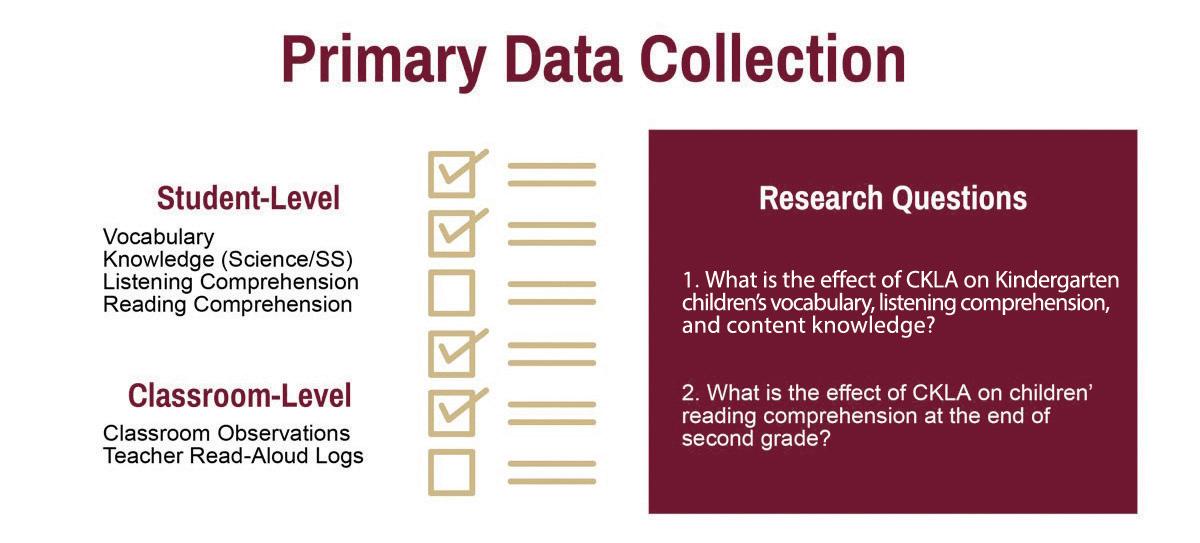

MAP-R aims to improve morphological knowledge, academic vocabulary, and reading comprehension of students in 3rd-5th grade. The project provides computer-delivered supplemental instruction.
MAP-R is designed to:
mapr.fcim.org/
Carla Wood carla.wood@cci.fsu.edu
Michelle Torres-Chavarro mc13r@fsu.edu
Chris Schatschneider schatschneider@psy.fsu.edu
Sana Tibi Sana.Tibi@cci.fsu.edu
Kristen Guynes kristen.guynes@fsu.edu
Feng Feng Ke fke@admin.fsu.edu


• provide explicit instruction on prefixes, suffixes and word roots/ bases to improve students’ vocabulary and reading comprehension;
• reduce the burden on teachers for implementing morphology-focused explicit instruction based on the science of reading;
• improve access to language supports for all students by providing instruction that includes on-demand individualized supports;
• positively impact students’ word knowledge

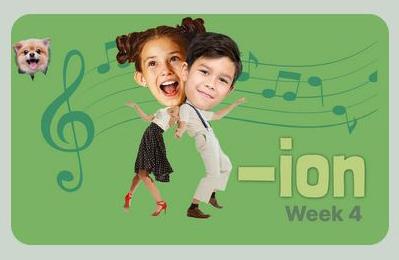



The purpose of this study it to examine the efficacy of language, behavior, or a combination of language and behavioral interventions for students classified as English language learners (ELLs) who are also atrisk for ADHD. Although there is substantial support for language development and reading interventions to aid young children in the acquisition of language skills, there is a significant lack of research addressing interventions for ELLs with disabilities of any type, particularly for ELLs with behavior disorders such as ADHD. This study addresses this gap by comparing the efficacy of language intervention alone, behavioral intervention alone, and a combined language and behavior intervention on student language and behavior outcomes.
This project is expected to take place from May 2022 to July 2026. Over the next three years, approximately 300 students are expected to participate. Participant criteria include being identified as an ELL level 1 through 4 by their school district, enrolled in kindergarten or 1st grade during the year of participation, having 6 or more symptoms of ADHD that are endorsed by a parent or teacher, having a teacher who is willing to participate and has a parent or a primary caregiver who is willing to participate. This project will involve three intervention conditions: 1) an educational language intervention involving small-group, interactive reading emphasizing dialogic reading as well as expressive and receptive syntax; 2) a behavioral classroom intervention in which a behavioral consultant will support parents and teachers in the implementation of a daily report card (DRC); and 3) a combined intervention in which students receive both the language intervention and the behavioral classroom intervention. Participants will be assessed three times throughout the school year; once before intervention (Pre-test), once in the middle of the school year (Midtest), and once at the end of the school year (Post-test). Coinciding with assessment, there are four rounds of classroom and fidelity observations.
Christopher J. Lonigan, Ph.D. Co-Principal Investigator (850) 644-4959 lonigan@psy.fsu.edu
Karli Borowski Willis, M.Ed. Intervention Coordinator (850) 645-1172 kborowski@fcrr.org
Currently, we do not have empirically derived guidelines for teaching emergent literacy skills for young children with autism spectrum disorder (ASD). A “one-size-fits-all” approach will be insufficient, given the heterogeneity of ASD. Our ultimate goal in this 4-year project is to develop an adaptive approach to reading instruction within the natural— and developmentally appropriate—context of shared book reading. Instruction will be responsive and flexible based on the child’s needs. We begin our instruction with an established shared book reading intervention (i.e., Dialogic Reading or Print Referencing). Depending on children’s level of engagement during reading sessions, we may continue with the same reading condition, modify instruction, or switch to an alternate shared reading intervention.

Jennifer Berrien Project Coordinator
Veronica Fleury Principal Investigator
STE-PAGES@fsu.edu
Florida State University
Oklahoma State University
Vanderbilt University


Dr. Tricia Zucker Principal Investigator
Tricia.Zucker@uth.tmc.edu

Dr. Sonia Cabell
Co-Principal Investigator scabell@fsu.edu
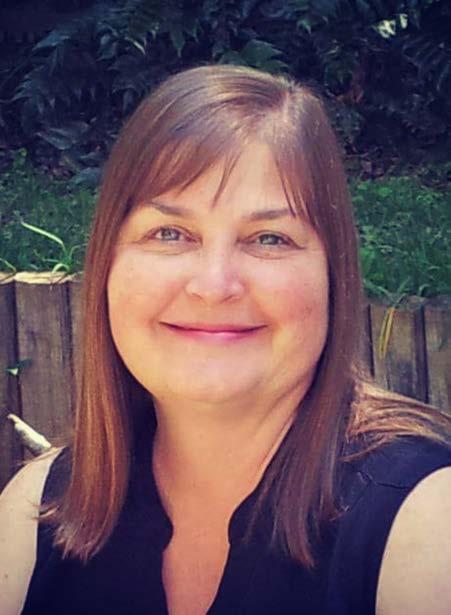
Manager mwyatt@fcrr.org
This randomized control trial examines the efficacy of the Teaching Together program for prekindergarten (pre-k) children who are at risk of academic difficulties due to limited oral language skills. This project is unique in its focus on oral language supports in both the classroom and home settings.
In early childhood classrooms serving low-income students, up to 50% of children may exhibit language difficulties, which are associated with long-term challenges for reading and academic success. Evidence demonstrates that early language difficulties can be reduced or ameliorated by providing universal/Tier 1 or targeted/Tier 2 language interventions at school and home.
The 20-week PreK On My Way classroom intervention includes four Tier 1 whole-group and four Tier 2 small-group lessons per week delivered by the classroom teacher. In addition to the classroom supports, the TT family intervention includes:
The interventions emphasize shared book reading, vocabulary explanations, multiple-turn conversations, and language support strategies.
Our goal is to understand the benefits and costs of increasingly tailored, tiered interventions in school only or at school plus home.
Teaching Together Study Design
The Children’s Learning Institute at The University of Texas Health Science Center at Houston


Home literacy environment (HLE) refers to children’s exposure to and engagement in reading related activities in the home.
In this study, HLE included:
• How often family members read with their child in a typical week
• How long the child is read to at each of these times
• Number of children’s books in the home
• How often the child looked at picture books outside of school
• How often the child pretend to read outside of school
We found that learning disability (LD) children had lower HLE the summer before kindergarten than nonLD children. This indicated that prior to formal reading instruction, LD children already had less exposure to reading than their non-LD peers. Additionally, we found that higher HLE predicted higher end-of-kindergarten reading achievement. HLE appears to be important to early reading achievement. Finally, the HLE was equally important to the reading achievement of children with and without LDs.
1. At the start of kindergarten reading instruction, in addition to struggling with reading due to having an LD, LD children have also had less exposure to text than their non-LD peers.
2. High HLE is associated with higher reading achievement at the end of kindergarten, and thus, we encourage parents to frequently read with their children before formal education increases their text exposure.
3. HLE is equally important to the early reading achievement of children with and without LDs.
Rachelle Johnson Principal Investigator rjohnson@psy.fsu.edu
Dr. Richard Wagner Co-Principal Investigator rkwagner@psy.fsu.edu
Dr. Sara Hart
sara.hart@uwaterloo.ca

We used the data of 1,000 children with LDs and 1,000 without LDs from the Early Childhood Longitudinal Study–Kindergarten Cohort of 20102011 (ECLS-K:2010). This is a nationally representative dataset.
osf.io/preprints/ psyarxiv/e6th2

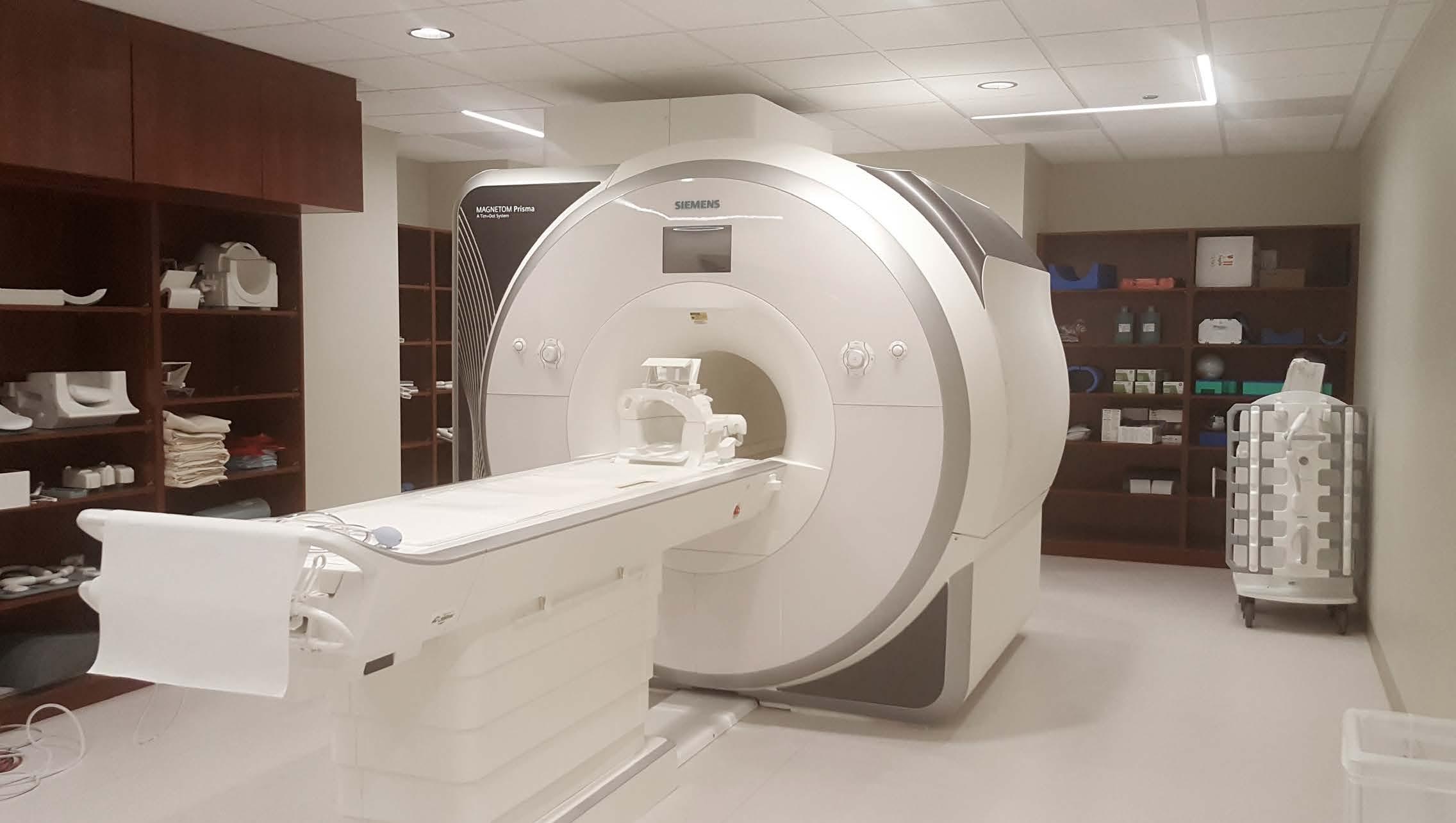

The transition to high school can be a tough time for teenagers. High school freshman face new academic challenges and are at an increased risk for developing mental health problems. Getting good sleep is crucial for these teens, yet for many reasons (e.g., biological rhythms, work demands, early school start times) high schoolers notoriously do not get enough sleep. The Snooze Study is focused on how sleep and school start times influence academic achievement, mental health, and brain activity in teenagers who are starting high school. In the Snooze Study, we ask teenagers to come into our lab at FSU to complete MRI brain imaging, computer-based testing, and questionnaires about daily routines, moods, and mental health symptoms. We also ask teenagers to wear Fitbits for a week to get data on their activity and sleep. This rich data lets us ask ‘How does sleep and school start times impact the lives and neurobiology of teenagers transitioning to high school?’ Results from this study can inform important policies around school start times and programs to give teenagers starting high school the best shot at success!


of the role of sleep and school start time for academic achievement and mental health in youth transitioning to high school.



Florida Interdisciplinary Research Fellows in Education Sciences & Preparing the Next Generation of Reading Disabilities and Dyslexia Researchers
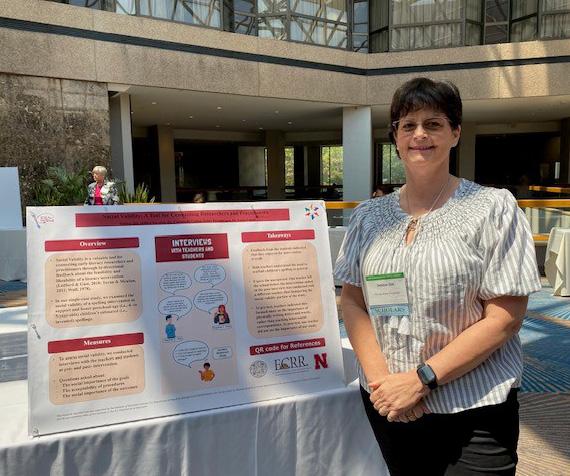

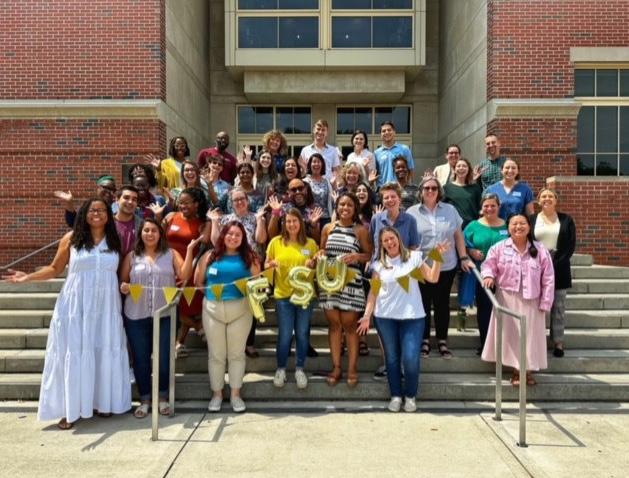

Catie Goodman
Project Manager
cjgoodman@fcrr.org
fcrr.org/projects/fireflies fcrr.org/projects/r2d2

FIREFLIES: FCRR is training the next generation of education researchers with the necessary research, leadership, entrepreneurial, and professional skills to increase the quality, accessibility, use, and relevance of education research and to improve reading outcomes for all learners. Focused on the interdisciplinary study of reading, 18 doctoral fellows are being prepared to succeed as education researchers in a variety of contexts, including institutions of higher education, local and state education agencies, and nonprofit research organizations.

R2D2: Led by faculty in the School of Teacher Education and the FCRR, the R2D2 doctoral training program is training 10 scholars in Reading or Special Education who will be ready to train effective teachers, conduct rigorous research, and lead the field. With partners in schools and communities throughout the nation, R2D2 scholars are a part of a thriving inclusive and interdisciplinary intellectual community dedicated to advancing the science of reading to improve learning and achievement for all learners.

Pursue your PhD* at the Florida Center for Reading Research at Florida State University in Tallahassee, FL.
The purpose of Project TRANSLATE is to prepare the next generation of scholars with expertise in reading education (including reading disabilities) who will secure faculty positions in institutions of higher education to effectively prepare future teachers, conduct research, and provide service, leadership, and translation within the field of reading education.
We are recruiting 5 scholars to begin in Fall 2025.
Deadline for Application: December 1, 2024
For more information, contact: Dr. Sonia Cabell, scabell@fsu.edu
Annual funding package (4 year program)
• Stipend of up to $34,000 per year
• Up to $12,000 per year to cover tuition and student health insurance
• Up to $3,000 per year Research, Travel, Engagement, and Development Fund
• Money for a computer


*PhD in Curriculum and Instruction in the School of Teacher Education, Reading Education or Special Education major College of Education, Health, and Human Sciences



Begun in 2019, this university partnership focuses on reading achievement, early learning, students with disabilities, and college & career pathways for students in Leon County Schools.

2020-2022: Develop actionable research plans based on school and district policy and practice needs. Goals
100%
of schools participating in communities of practice maintained or improved their school grades since 2018.
School
Pineview Elementary School*
Oak Ridge Elementary School*
Springwood Elementary School*
WT Moore
Elementary School
Woodville School*
Students Impacted
2023 & Beyond: Build capacity, share practices, sustain outcomes, expand support
20182024
Nims Middle School* A C C C B B F D C D B C *Title 1 School
Celebrate our success, but expand our scope locally.
Expansion allows the opportunity to broaden collaborative efforts, invite more stakeholders and use research to address more diverse educational challenges.
Our research together supports student achievement because it informs:
Targeted, evidence-based professional learning for teachers, coaches and principals.
Aligned family and community engagement activities and events.
Facilitated communities of practice for researchers and partners.
By sharing our findings, we increase the impact of our research and partnership at home and around the nation. Amplify the results and share our story.

REL Southeast is one of ten Regional Educational Laboratories that work in partnership with school districts, state departments of education, and others to use data and research to improve academic outcomes for students. Fundamentally, the mission of the RELs is to provide support for a more evidence-reliant education system.
REL Southeast brings together the critical elements for success: a thorough knowledge of the region’s education systems and contexts; a history of responding to the needs of state and local educators within the region; deep understanding of the critical issues to be addressed; and extensive expertise in research, analytical technical support, and dissemination. Our strengths include a strong presence in each state served and long -standing working relationships with state and local educators throughout the region.
REL Southeast is located at Florida State University in Tallahassee, Florida, and led by Dr. Nicole Patton Terry, Director of the Florida Center for Reading Research. REL Southeast partners with American Institutes for Research, Innovative Behavioral Services, Instructional Research Group, MK Educational Research & Practice, RMC Research Corporation, Research Triangle International, and SERVE Center at UNC Greensboro.

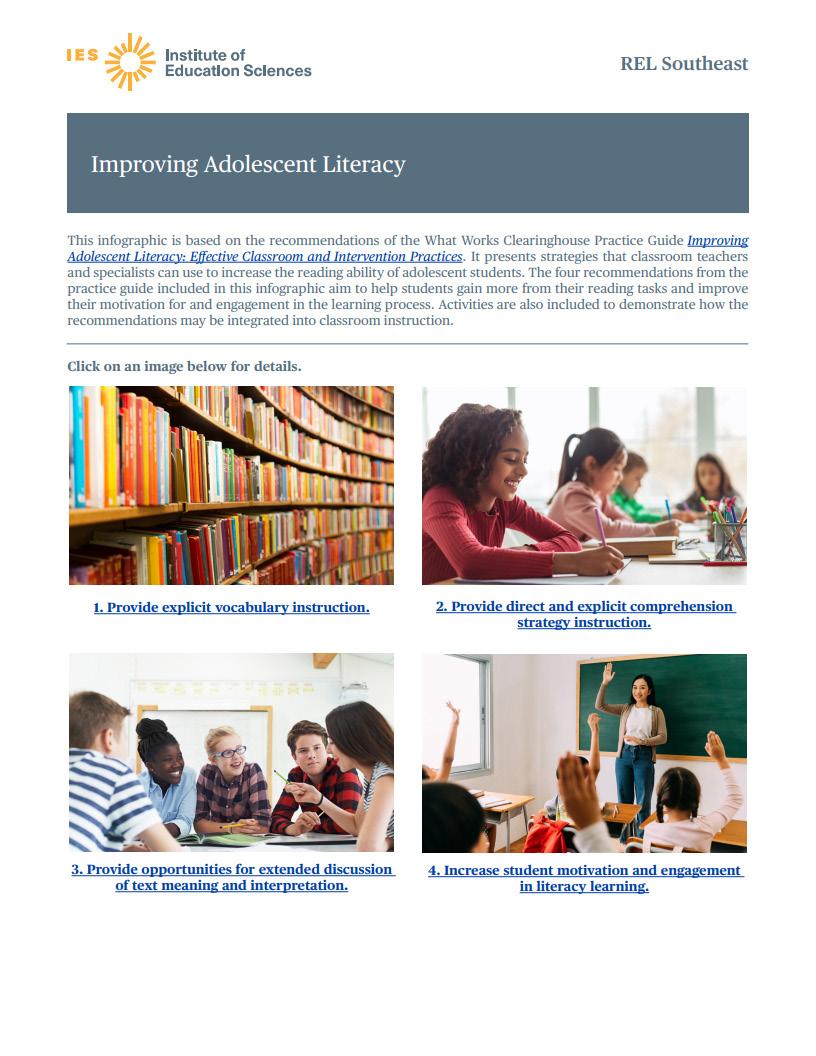



ies.ed.gov/ncee/rel/ region/southeast
Dr. Nicole Patton Terry Director npattonterry@fsu.edu
Dr. John Hughes Deputy Director jhughes@fcrr.org
General Contact rel-se@fsu.edu
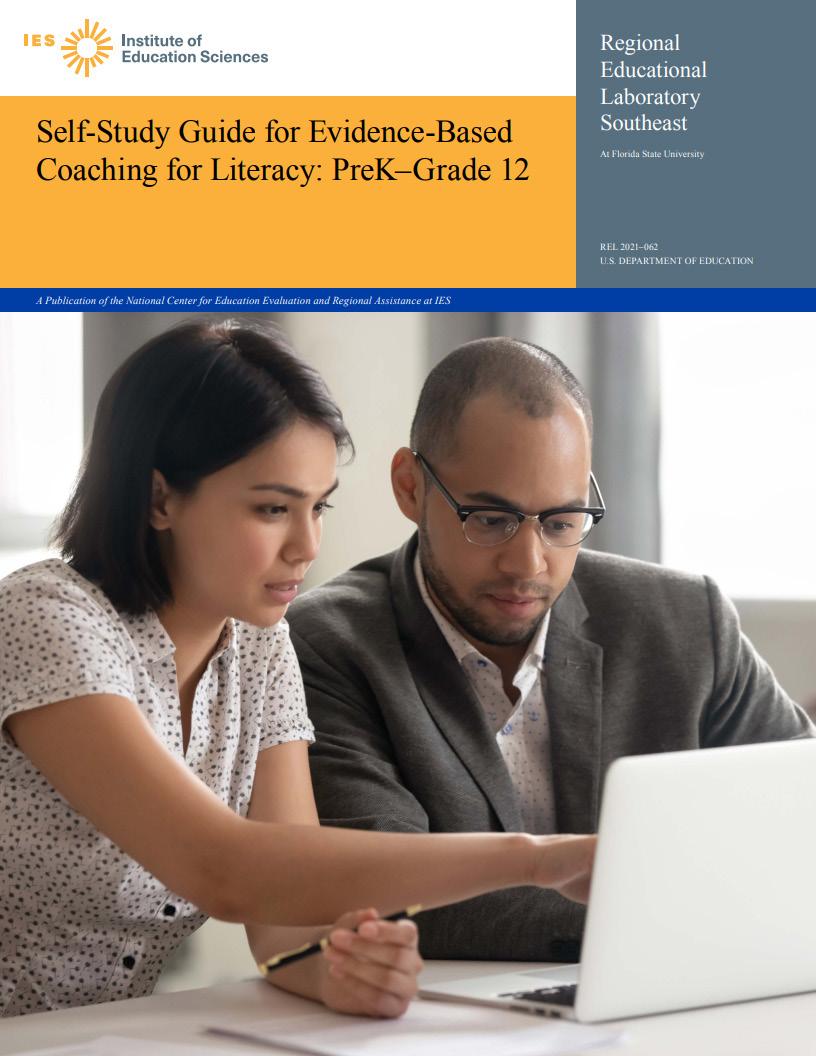

Laurie Lee
Principal Investigator llee@fcrr.org
Kevin Smith
Principal Investigator ksmith@fcrr.org
ies.ed.gov/ncee/rel/ region/southeast/ partnerships/100125
The goal of this partnership is to improve the literacy skills of students in grades 4-12. Two projects are associated with the partnership. The first provides training to English, social studies, and science teachers to help them incorporate evidence-based literacy practices into their instruction. The second project provides training to literacy interventionists to help them use evidence-based practices in their instruction to students who need additional support. When students are supported in literacy throughout the school day, their skills and abilities should improve.


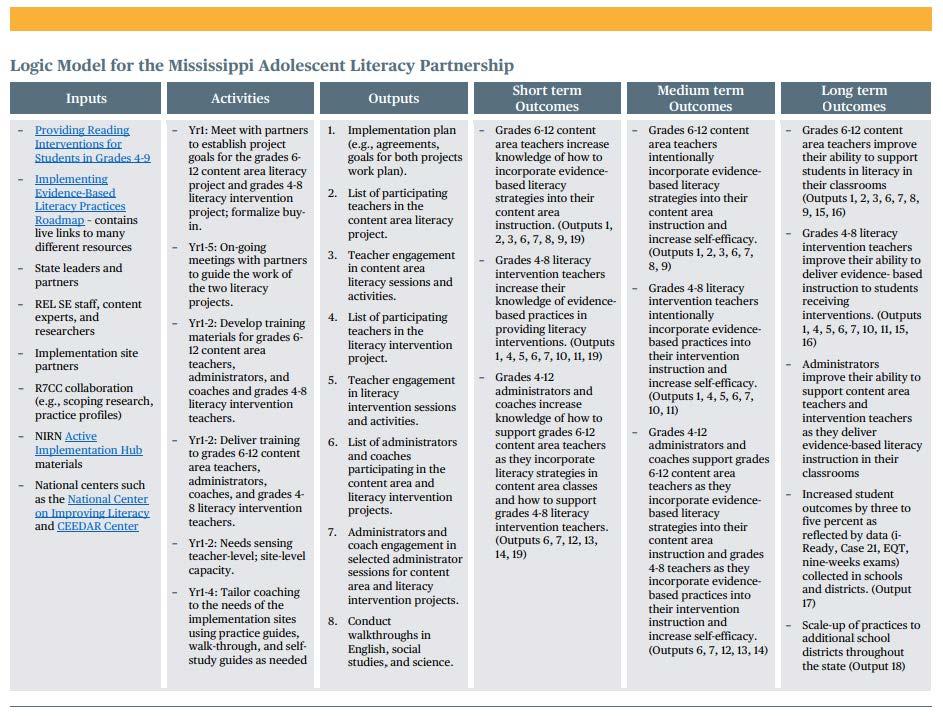





The SC PLC EL is a collaboration between key state education agency representatives, seven preschool sites in two SC school districts, and the REL Southeast. The goal of the partnership is to explore the implementation of Professional Learning Community: Emergent Literacy (PLC-EL) and learn about impacts on teacher practice and student outcomes to inform scaling across SC.
The PLC-EL is a suite of materials designed to improve teacher use of evidence-based practices to support emergent literacy development in the areas of print knowledge, phonological awareness, vocabulary, and oral language. With the support of a trained facilitator, the PLC-EL materials are designed to guide preschool teachers as they collaborate through discussions, engage in hands-on activities, and reflect on their own implementation of strategies learned during PLC-EL sessions.
The partnership seeks to learn about the conditions, facilitators, and barriers that affect implementation of the PLC-EL. The partnership is engaging in three primary projects:
1. Intensive coaching with a small cohort of demonstration sites to implement PLC-EL to understand and address barriers to implementation,
2. An applied research study to evaluate the implementation and impact of PLC-EL on teacher practice and student outcomes, and
3. Development of a PLC for early childhood administrators (PLC-ECA) that aids ECA as they plan and support implementation of the PLC-EL in their schools.
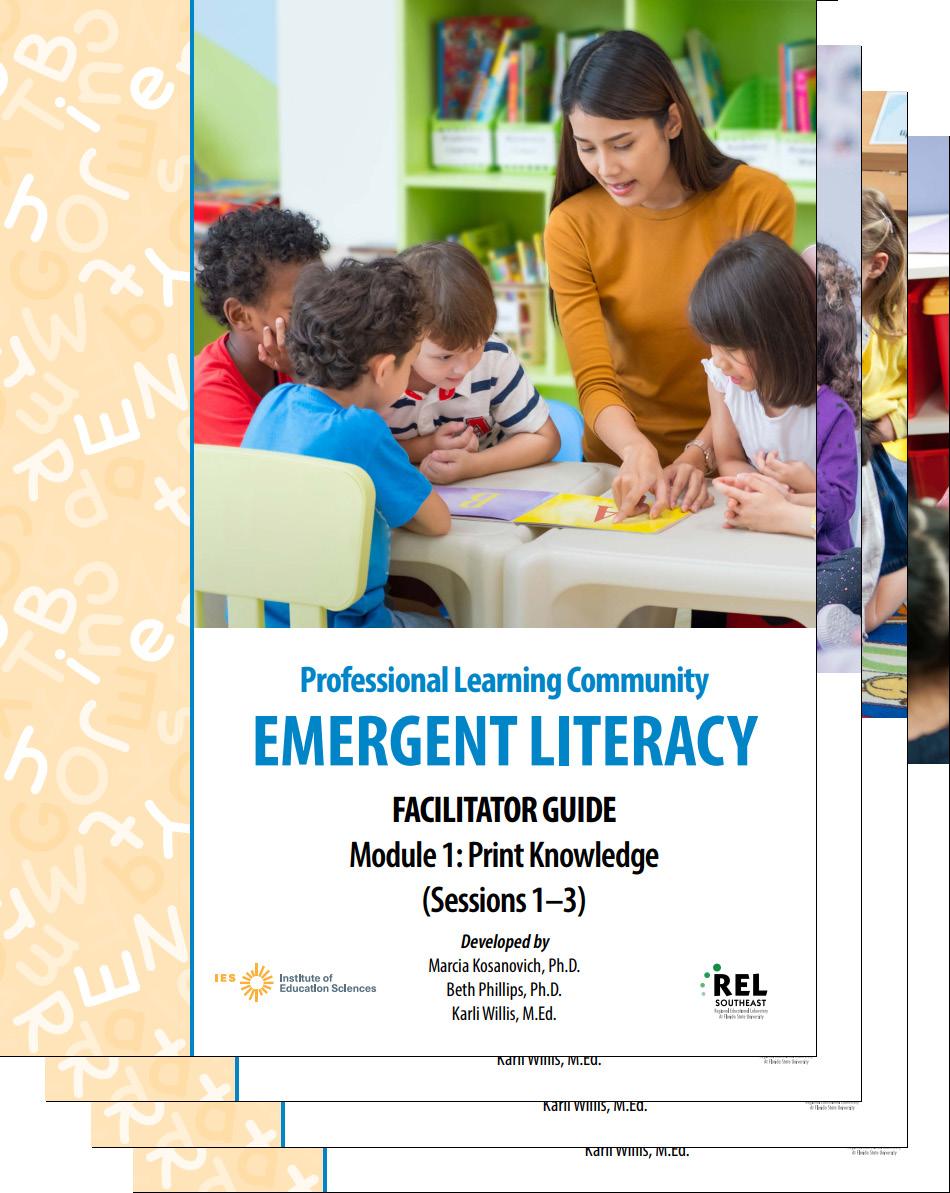
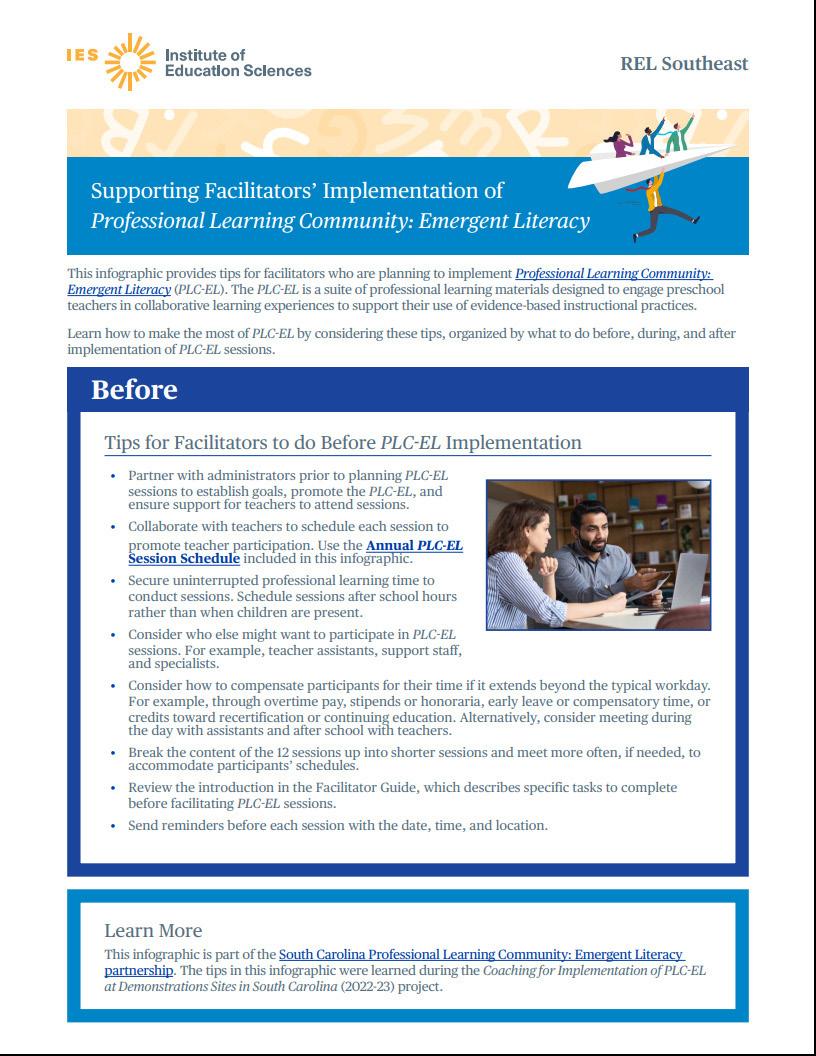
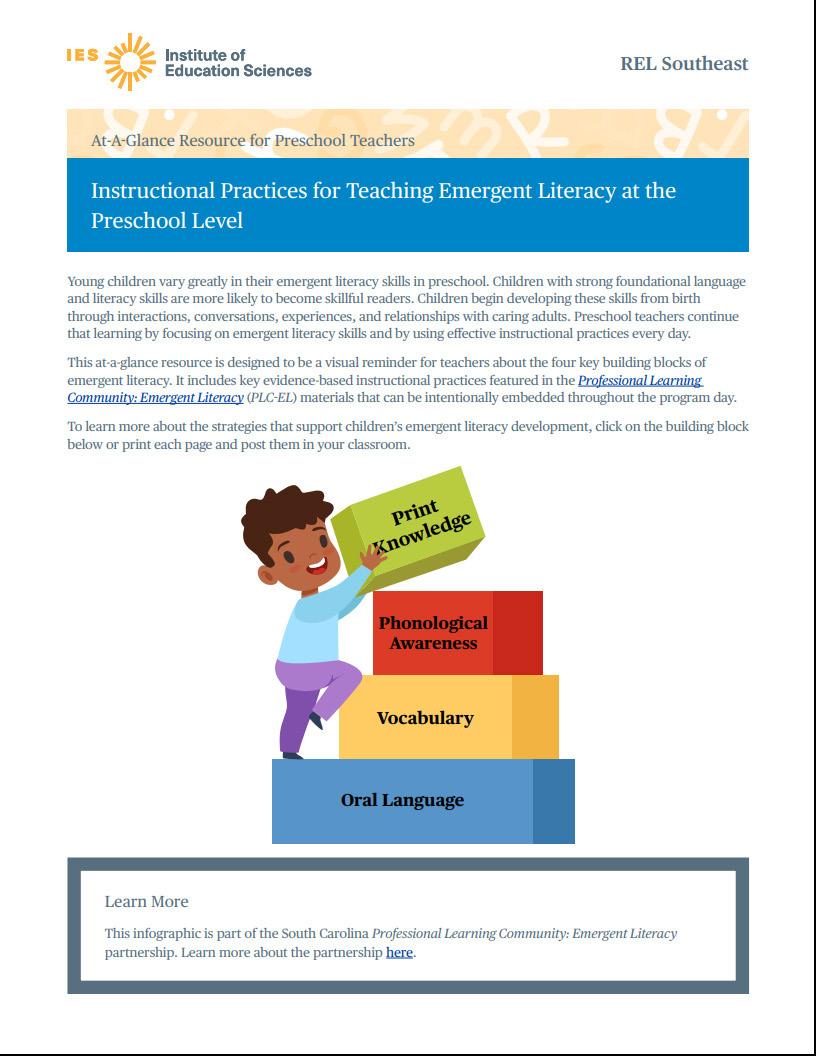



ies.ed.gov/ncee/rel/ region/southeast/ partnerships/100128

Sarah Hughes Partnership Lead shughes@rmcres.com
Marcia Kosanovich
PLC-EL Author & Coaching Project Lead mkosanovich@fcrr.org
Sarah Herrera Applied Research Study Project Lead sherrera@fcrr.org
Karli Willis PLC-EL Author & PLC-ECA Project Lead



Marcia Kosanovich Principal Investigator mkosanovich@fcrr.org

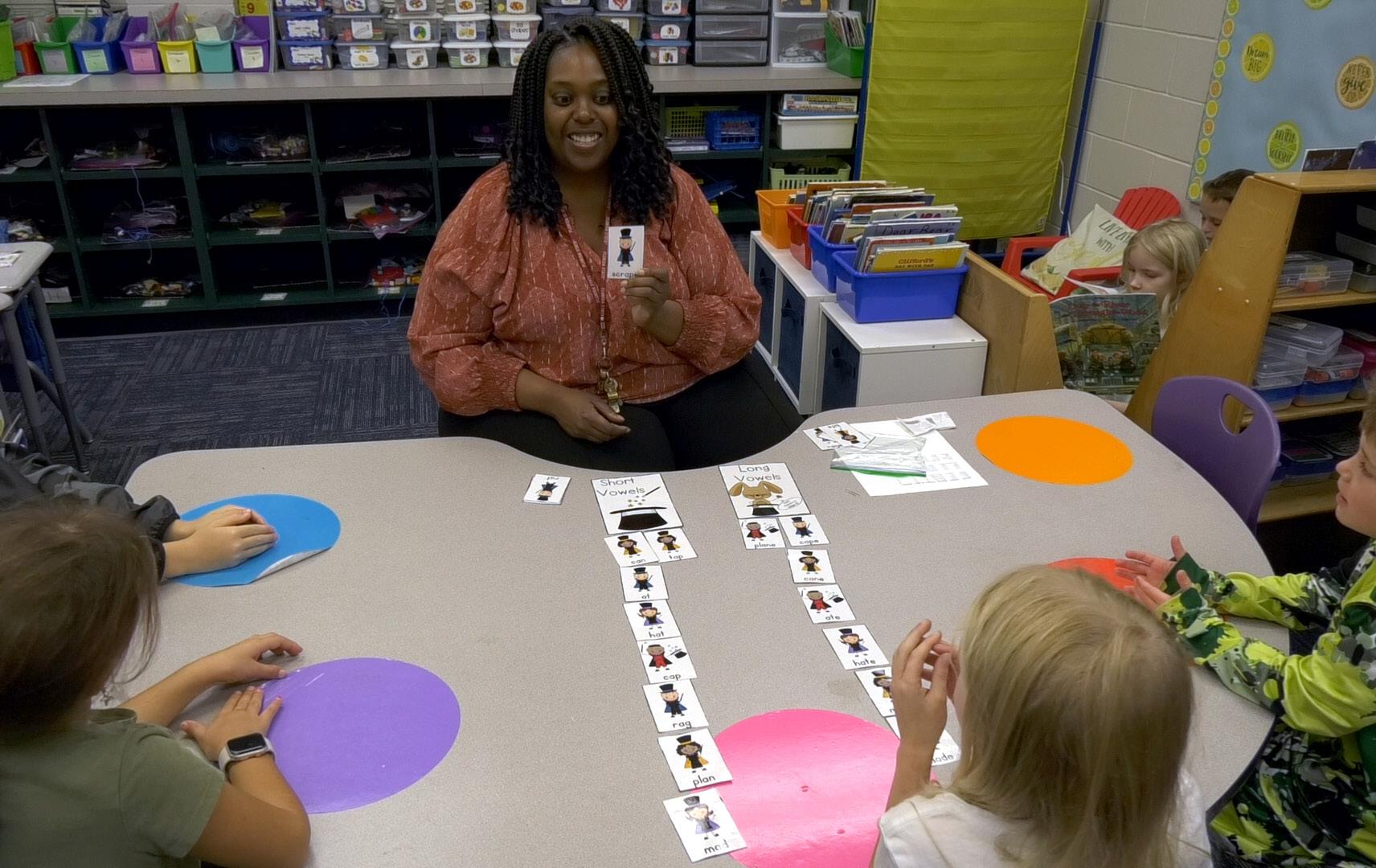
This Toolkit is designed for grades K-3 teachers who provide classroom reading instruction and the reading specialists and educational leaders who support them. It is designed to promote change in teacher practice and student outcomes by supporting teachers in how to differentiate tier 1 instruction to help improve reading instruction for ALL students.
The content of the Toolkit is based on the What Works Clearinghouse (WWC) practice guide, Assisting Students Struggling with Reading: Response to Intervention (RtI) and Multi-Tier Intervention in the Primary Grades from the Institute of Education Sciences (IES) at the U.S. Department of Education. The Toolkit materials include three teacher professional development modules, classroom videos, self-reflection checklists, support for facilitation of the modules, and resources for leadership and sustainability. This Toolkit is not yet released as it is being prepared for an efficacy study.
Kevin Smith
Toolkit Development Team ksmith@fcrr.org
Laurie Lee
Toolkit Development Team llee@fcrr.org

Sharon Koon Senior Research Associate skoon@fcrr.org
Latara O. Lampkin Senior Research Associate losbornelampkin@fcrr.org
Yi-Chieh Newton Associate in Research ywu@fcrr.org
Jackson State University
Tougaloo College
Mississippi Department of Education (Office of Teaching and Leading, Division of Educator Talent Acquisition, Division of Educator Preparation)
Vicksburg-Warren School District,
National Institutes for Historically-Underserved Students,
Florida A & M University
Other Affiliated Mississippi PostSecondary Success at HBCUs Research Consortium Partners (Alcorn State University, Hinds Community College-Utica Campus, Mississippi Valley State University, Rust College),
Innovative Behavioral Services, Inc.

The Diversifying the Teacher Pipeline with Historically Black Colleges and Universities (HBCUs) Partnership is focused on increasing knowledge and the implementation and dissemination of evidence-based practices to inform preservice and in-service initiatives to enhance and diversify the educator pipeline and workforce. With partners from HBCUs, state agencies, and local educational agencies the partnership promotes collaboration and coordination among entities to engage in technical support and research activities that will inform initiatives being conducted at the institutional level at HBCUs, as well as at state and district levels.



ies.ed.gov/ncee/rel/ region/southeast/ partnerships/100122
ies.ed.gov/ncee/rel/ region/southeast/ partnerships/100123
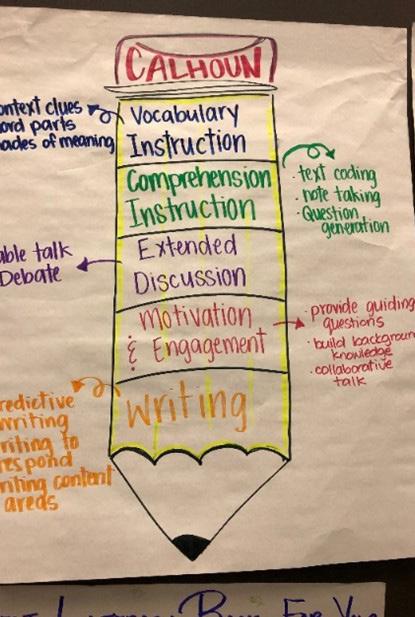



Laurie Lee
Principal Investigator llee@fcrr.org
Kevin Smith
Principal Investigator ksmith@fcrr.org

The REL Southeast Florida Panhandle K-5 Literacy Partnership is a collaborative group of literacy educators from 14 small and rural school districts across the region and the organization that supports them, the larger central school district within the region, and the Florida Department of Education. The partnership is focused on increasing knowledge and implementation of evidence-based practices in literacy at elementary schools across the area.
